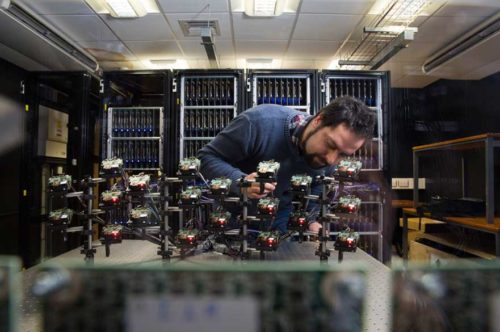Overview
Electronic engineers are employed in a multiplicity of high technology industries where they find solutions and develop new technologies in fields such as signal processing, computing, and communications engineering.
- This programme in electronic engineering aims to deliver strong academic content, conveyed with a strong factual focus with the aim of preparing you, upon successful completion, to take on the challenges present in the many fields of engineering and research which require electronic engineering graduate expertise.
- At Coventry University, we believe that studying engineering should be so much more than acquiring theory and passing examinations. Our Activity-Led Learning (ALL) approach aims to enable you the opportunity to develop your skills and knowledge by working on real-life problems and projects, many commissioned by our industry partners.
Why you should study this course
You will likely find electronic engineers developing a wide range of applications and cutting-edge technology such as power-dense electronic controllers, creating an integrated RF analogue-to-digital signal devices, developing scalable, multi-function, phased array radar systems, or designing algorithms for use in a diverse range of applications such image processing.
- Designed to meet the Engineering Council UK-SPEC standard, the course curriculum covers the essential principles of electronic engineering. It aims to develop the advanced skills needed by today’s graduates to develop high quality solutions in electronic engineering systems. Successful completion of this course provides a solid foundation from which to commence a potential future career in electronic engineering.
- The programme includes an Add+vantage module at every year of study, available from a diverse subject range so as to provide opportunities to customise your study.
- From the outset, we aim to place an emphasis on innovation, design, and development to enable you the opportunity to enrich your technical and transferrable skills.
- You’ll have the chance to access to the latest technologies in the fields of electronic engineering via our well-equipped micro-electronics laboratories, power drives laboratory and other dedicated project facilities (subject to availability).
- You will be taught by current staff with substantial research experience and expertise in areas such as: photovoltaics; semiconductor devices modelling, simulation, design and fabrication; electromagnetics; iron core saturation; control theory and applications; wireless sensors and embedded micro-electronics, so as to inform your study of new developments within the fields of this programme. Please note that staff are subject to change.
How you’ll learn
Learning on these programmes is via a blend of lectures and seminars along with tutorials. A significant part of your studies and learning will be derived from simulation and or seminar laboratory classes. A personal tutor will guide throughout your programme of study.
Actual teaching contact hours will vary depending on the level of study and the requirements of a particular semester. In a typical week your time will be divided amongst personal tutorial and small group teaching; medium group teaching (e.g. seminars, tutorial sessions, lab sessions and workshops); and large group teaching (lectures).
The highly applied nature of the programme aims to enable you to work with staff on real-world problems from industry, commerce, and research groups (subject to availability), therefore having the opportunity to simulate work that you may be subjected to in professional practice, upon graduation. Past students have undertaken studies in alternative energy, particularly in the field of PIC development applications.
Assessment
Course curricular will be assessed using a variety of methods depending upon the nature of each module. Assessment methods include formal examinations, coursework, tests, portfolio, practical or project work, group work, demonstrations, presentations, and posters.
The Coventry University Group assessment strategy ensures that our courses are fairly assessed and allows us to monitor student progression towards the achieving the intended learning outcomes.
Job ready
On successful completion, you will have comprehension of:
- Scientific principles and methodologies relevant to electronic engineering.
- Mathematical and quantitative methods used in engineering analysis and design.
- Engineering project management including ethics, finance, risk, health and safety, and similar issues.
- The wider multidisciplinary context of engineering, incorporating social, economic, and environmental issues.
On successful completion, you will have expertise in:
- Solving technical and management problems involving uncertainty.
- Design of innovative products and systems employing recognised methodologies.
- Planning and executing research-oriented project work.
- Selecting and apply appropriate components, materials and manufacturing processes.
- Planning and executing practical work involving experimentation, data collection, prototype construction, testing and specialised instrumentation.
- Use of specialised software tools and information technology equipment.
- Accessing and evaluating information sources including technical literature, standards, and codes of practice.
International experience opportunities
Electronic engineering is applied throughout the world and, as such, we aim to adopt a global perspective within our teaching. During the course you may have the opportunity to engage on a Collaborative Online International Learning (COIL) project or to spend a period abroad for part of your studies*. This may be through an organised exchange programme or faculty-funded projects that aim to support national development themes.
Zobacz więcej na stronie uniwersytetu >>
Wiza studencka do Wielkiej Brytanii
Aby studiować w Wielkiej Brytanii potrzebujesz wizy studenckiej. Aby złożyć wniosek o taką wizę studencką musisz zdjać certyfikat językowy na poziomie B2.
Uważaj! Do celów wizowych musisz wybrać wyłącznie egzamin w wesji Secure English Language Test (SELT) UKVI .
Co to jest test SELT UK VI registration? Przeczytaj więcej o




















